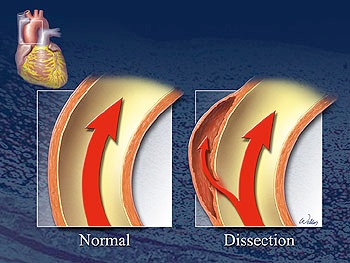aortic dissections



Aortic dissections are often life threatening. Patients with connective tissue disorders and poorly controlled hypertension are at risk of developing dissections. There are three layers to the arterial wall; a dissection occurs when there is a tear in the inner layer of the wall, which is known as the intima. Due to the high pressure of blood flow within the aorta, blood enters the tear and enters the middle layer of the wall, which is called the tunica media. The pressure of flow forces the tear to extend either back towards the heart or forward towards the abdomen. There are two types of dissection:-
Type A – These tears extend towards the heart and are life threatening.
Type B – Tears which extend away from the heart towards the abdominal aorta.
There is a wide range of symptoms. The vast majority of patients report severe pain in the back or in the front of the chest wall, which is sharp or tearing in nature. The location of the pain often relates to the site of dissection and it often moves as the dissection extends. Cardiac arrest, collapse, stroke and heart failure are other less common symptoms.
Treatment of dissections depends on the type and cardiovascular stability of the patient. Type B dissections can be managed with blood pressure control in the majority of patients. Endovascular repair, using a stent graft passed through the artery in the leg is indicated for complicated type B dissections. Surgical management is indicated for type A dissections and it is via open repair, which involves replacement of the damaged aorta with a synthetic graft. Occasionally, the aortic valve of the heart is damaged and needs to be replaced. This procedure is performed by cardiothoracic surgeons.
Previous: Abdominal and Thoracic Aortic Aneurysms
Aortic Dissections























